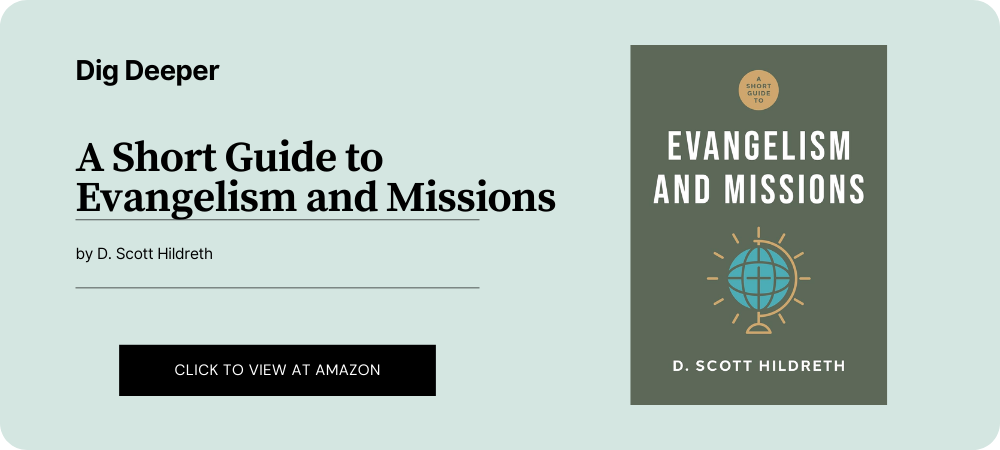I wonder if you think like I do. When I read through the gospels, I often wonder what it would have been like to walk alongside Jesus in the flesh. Even more, what would it have been like to walk alongside Jesus in his resurrected body? What was it like to witness, as those first disciples did, the resurrected Christ when he revealed himself to them? How did they feel when he ate that first food and allowed Thomas to touch the scars? I often think it would have been nice to see the empty tomb on that first Easter Sunday.
When the mission is hard, when evangelism seems risky, I am tempted to believe those first disciples came by their boldness because of their unique, once in history, experience of the risen Christ. When boldness in the mission and confidence in the message flags, it is tempting to long for some impossible experience to be our life raft, to dismiss obedience based upon the premise that we, unlike Paul and his Damascus road experience, are at a disadvantage. We have reason to shrink back, right?
But, perhaps that experience is not all we make it out to be.
Seeing is Believing?
At the end of his gospel, John records for us in detail that fateful moment at the tomb and then the following series of encounters with Jesus. Chapter 20 lays out painstaking detail. He tells of the footrace between he and Peter, he discusses the placement of folded burial clothing, he then provides a telling statement. John writes, “The other disciple [he’s speaking about himself], who had reached the tomb first, then also went in, saw, and believed” (John 20:8). This is an important clue to why John includes such detail.
He writes of the event with the clarity of an eye witness. He includes details that technically don’t matter. Why? The most obvious reason is simply because that’s how it happened. Furthermore, John writes of his experience seeing the empty tomb. He went in, saw, and believed. He goes on to say, “For they did not yet understand the Scripture that he must rise from dead.” For John in that moment, the experience of seeing was more clear than the revealed testimony of God’s Word.
In those first years of the church, the end of the gospels and the book of Acts tell of an entire generation that saw Jesus, in the flesh, after he was raised from the dead. The claims do not go away. Enough people believed these eye witness testimonies that a whole movement started. Multiple gospel writers explain that at least one purpose in their writing was to lay down the evidence of eye-witnesses. What a unique moment in the history of the church.
Surely, if we had that same experience, our spiritual formation would not be so difficult. Our faith would be steadfast. Our desire to spread the gospel, to evangelize our neighbor, to give up everything to go to the nations would be unflappable. After all, seeing is believing… right?
Experience is a Fickle Tutor.
John records his reaction at the empty tomb as belief born in sight. But that’s not the end of his narrative. Let’s continue reading.
In verse 11, John picks up the story from Mary’s perspective. She is outside the tomb crying. While crying, she stoops to look inside the tomb and she does not merely see folded linens, she spies two angels. Not only does she see them, they speak to her, asking why she is crying. It gets better; after answering the angels as though they seem to be random strangers, she turns only to see Jesus himself.
Notice the next words, “… but she did not know it was Jesus” (John 20:14). Instead, to the reader’s incredulity, John says that Mary mistakes the Lord of Glory for the gardener of the graveyard!
Now let me stop here. Yes, there are all kinds of plausible reasons why seeing angels and even the risen Christ would not immediately result in clear understanding of the moment. She was certainly distraught and addled. There is no indication in the passage that these angels appeared in the same dazzling manner recorded elsewhere in Scripture when angels appear. Finally, Mary is not the only one in those days after the resurrection who mistakes the identity of Jesus based on his appearance. There is clearly something different about the resurrected Jesus.
But that only strengthens the point here: experience is a fickle tutor, even when that experience is seeing the physically resurrected Jesus. When we read the book of Exodus, we feel the same incredulity. How could a nation witness the acts of God that unfold in that book and turn around, within days, and fashion themselves a golden calf? Because experience is a fickle tutor.
The story goes on to report that Mary does correctly identify Jesus. She does so by hearing His voice, by his words.
A Word Strongly Confirmed
In his first letter to those chosen, living as exiles dispersed across Asia minor, Peter exhorts, “Though you have not seen him [that is the risen Christ], you love him; though not seeing him now, you believe in him, and you rejoice with inexpressible and glorious joy, because you are receiving the goal of your faith, the salvation of your souls” (1 Peter 1:8–9). He continues to explain how such a love could occur without this first-hand experience. He writes,
Concerning this salvation, the prophets, who prophesied about the grace that would come to you, searched and carefully investigated. They inquired into what time or what circumstances the Spirit of Christ within them was indicating when he testified in advance to the sufferings of Christ and the glories that would follow. It was revealed to them that they were not serving themselves but you. These things have now been announced to you through those who preached the gospel to you by the Holy Spirit sent from heaven—angels long to catch a glimpse of these things (1 Peter 1:10-12).
The prophets of old, those who delivered to us God’s Word were not merely serving themselves and their own generation. No, they were serving us. And those who preached this gospel, this news of salvation from the very Word of God, announced to us a message more confirmed than mere experience.
In fact, that’s what Peter calls it in his second letter: a word strongly confirmed. He writes,
We also have the prophetic word strongly confirmed, and you will do well to pay attention to it, as to a lamp shining in a dark place, until the day dawns and the morning star rises in your hearts. Above all, you know this: No prophecy of Scripture comes from the prophet’s own interpretation, because no prophecy ever came by the will of man; instead, men spoke from God as they were carried along by the Holy Spirit (2 Peter 1:19-21).
Experience may be a fickle tutor, but God has given us a Word strongly confirmed.
To see the real impact of this Word-based foundation for life, mission, and ministry, look no further than the end of Luke’s gospel account. After the resurrection, Jesus reveals himself to his disciples in a series of events. We see yet another moment where merely experiencing the risen Christ does not lead to immediate understanding as he walks the road to Emmaus with unnamed disciples (Luke 24:13-27).
In this passage, Jesus does not turn them to what their eyes can see but the Scriptures to explain the events that had recently taken place in Jerusalem. Luke writes, “He [Jesus] said to them, ‘How foolish you are, and how slow to believe all that the prophets have spoken! Wasn’t it necessary for the Messiah to suffer these things and enter into his glory?’ Then beginning with Moses and all the Prophets, he interpreted for them the things concerning himself in all the Scriptures” (Luke 24:25-27).
Experience as Authority?
It is a you-do-you world nowadays. Telling someone that his own experience, interpreted through his own understanding, is anything other than completely accurate is one of today’s cardinal social sins.
Now, your mind may run to the sexual revolution occurring right now. I believe that is where we often go first. Certainly, that is a true instance of the experience-as-authority trope we see here. But, I want to bring it home to our own camp. How often do we let our circumstances (and our interpretation of them) determine how we understand the world, our own life, or the mission in front of us?
We need only look to Mary as she gazes on all the evidence before and completely misses the moment to see the error in trusting our experiences to guide our interpretation of reality. Jesus had already told the disciples the cross event would occur. He told them he would be in the grave and be raised. Frankly, we could rightly be surprised why they showed up at the tomb expecting anything other than a risen Christ. The same may be said of those on the road to Emmaus. Seeing is not always believing, and it is surely not always the best foundation for our hope.
At the very end of Luke’s gospel, he records these word by our risen Christ:
“These are my words that I spoke to you while I was still with you—that everything written about me in the Law of Moses, the Prophets, and the Psalms must be fulfilled.” Then he opened their minds to understand the Scriptures. He also said to them, “This is what is written: The Messiah will suffer and rise from the dead the third day, and repentance for forgiveness of sins will be proclaimed in his name to all the nations, beginning at Jerusalem. You are witnesses of these things. Luke 24:44-48).
When our boldness is flagging, when our confidence erodes, when we doubt our ability to do what the Great Commission asks of us, we must look to the risen Christ. We must listen to his voice, for His sheep know His voice. We find His voice first and loudest in the revealed Words of God to us.






